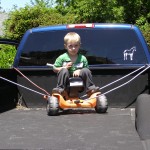Some of you may know of her or have read her book. Some of you will never have heard of her.
I discovered Jean Liedloff, author of The Continuum Concept: In Search of Happiness Lost, shortly after my son Orion was born 35 years ago. Her book profoundly impacted me because she confirmed and validated what I already envisioned as a parent.
She inspired me and gave me the courage to continue on the path I had begun. For this, I am deeply appreciative.
For two years as a young woman, Jean lived with Stone Age Indians in the South American rainforest. At first judgmental of their seemingly primitive and inadequate parenting, she discovered a new view of what human nature really is and what our children most need from us. She realized the limitations of our Western, ‘civilized’ ways of parenting.
Here is a must-see video that will most-likely challenge what you believe to be true as a parent and give you profound new insights in perceiving your child. Even if you are the parent of a teen or an adult child, you can learn a lot from this wise woman of our time.
The video is 53 minutes, and it is worth every second. Don’t let this go by! Create a time this weekend to watch it all. Share it with your partner. Let it make a difference in your life!
Watch the video here.
Enjoy!




 Just a little bit about me -- I'm a coach for parents, visionary guide, insightful trainer, and powerful consultant.
Just a little bit about me -- I'm a coach for parents, visionary guide, insightful trainer, and powerful consultant.